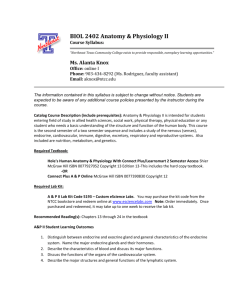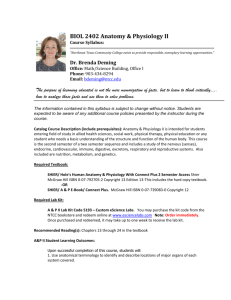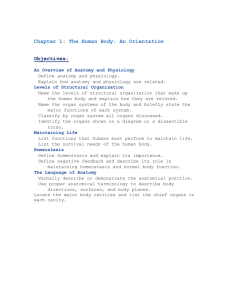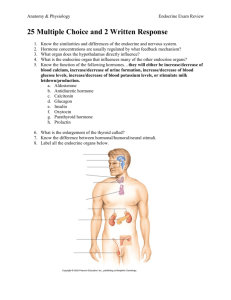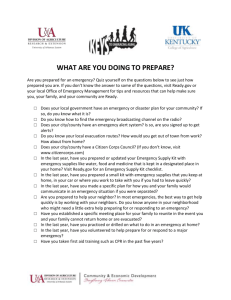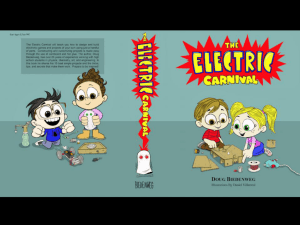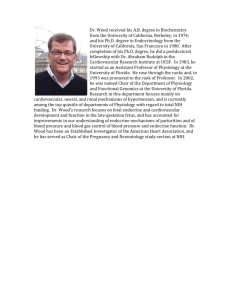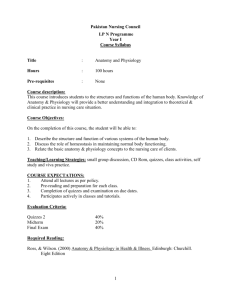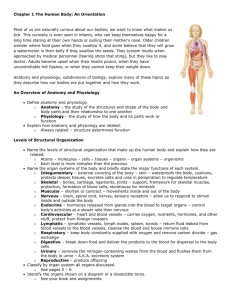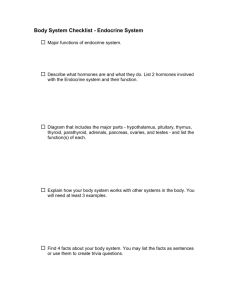BIOLOGY 1406 - Northeast Texas Community College
advertisement
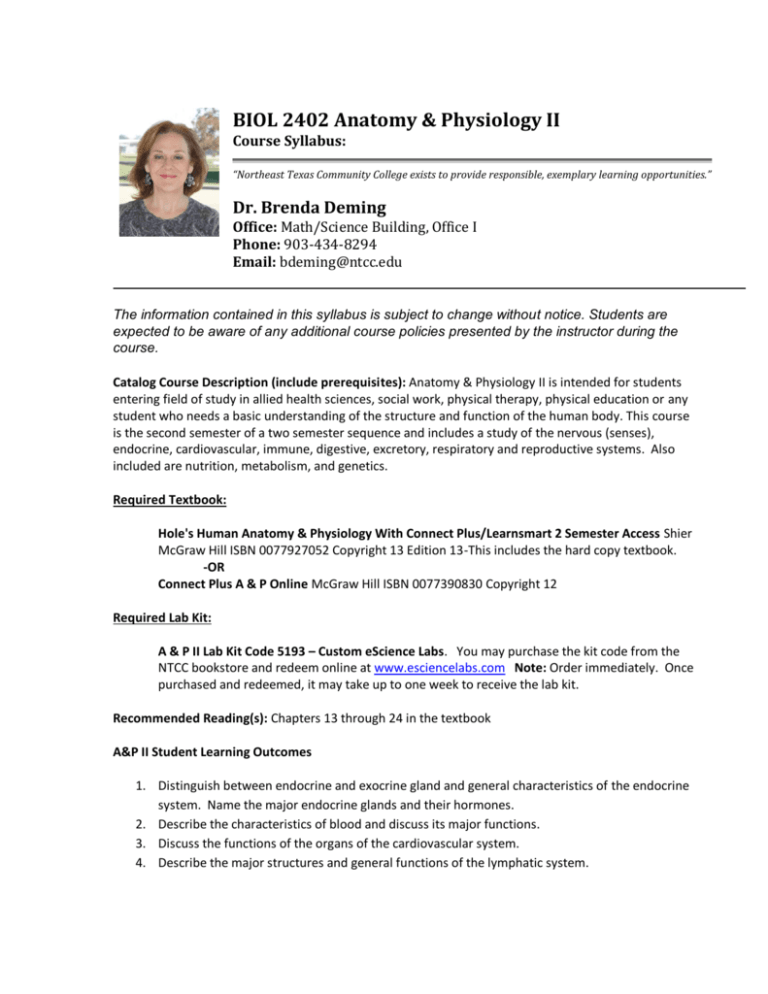
BIOL 2402 Anatomy & Physiology II Course Syllabus: “Northeast Texas Community College exists to provide responsible, exemplary learning opportunities.” Dr. Brenda Deming Office: Math/Science Building, Office I Phone: 903-434-8294 Email: bdeming@ntcc.edu The information contained in this syllabus is subject to change without notice. Students are expected to be aware of any additional course policies presented by the instructor during the course. Catalog Course Description (include prerequisites): Anatomy & Physiology II is intended for students entering field of study in allied health sciences, social work, physical therapy, physical education or any student who needs a basic understanding of the structure and function of the human body. This course is the second semester of a two semester sequence and includes a study of the nervous (senses), endocrine, cardiovascular, immune, digestive, excretory, respiratory and reproductive systems. Also included are nutrition, metabolism, and genetics. Required Textbook: Hole's Human Anatomy & Physiology With Connect Plus/Learnsmart 2 Semester Access Shier McGraw Hill ISBN 0077927052 Copyright 13 Edition 13-This includes the hard copy textbook. -OR Connect Plus A & P Online McGraw Hill ISBN 0077390830 Copyright 12 Required Lab Kit: A & P II Lab Kit Code 5193 – Custom eScience Labs. You may purchase the kit code from the NTCC bookstore and redeem online at www.esciencelabs.com Note: Order immediately. Once purchased and redeemed, it may take up to one week to receive the lab kit. Recommended Reading(s): Chapters 13 through 24 in the textbook A&P II Student Learning Outcomes 1. Distinguish between endocrine and exocrine gland and general characteristics of the endocrine system. Name the major endocrine glands and their hormones. 2. Describe the characteristics of blood and discuss its major functions. 3. Discuss the functions of the organs of the cardiovascular system. 4. Describe the major structures and general functions of the lymphatic system. 5. Name the major organs of the digestive system and describe the general functions. Explain how nutrition and nutrition is essential for health. 6. Name the major organs of the respiratory system and describe the general functions. 7. Name the major organs of the urinary system and describe the general functions. Explain the importance of water, electrolyte and acid/base balance. 8. Name the major organs of the male and female reproductive systems, describe the general functions of each organ and demonstrate knowledge of pregnancy and distinguish between growth and development. 9. Discuss genetics and how genetic information is transferred and expressed. 10. Be able to participate in experiments involving the appropriate use of appropriate materials, the identification of dependent and independent variables, the collection of qualitative and quantitative data, the interpretation of data, and the communication of results and conclusions. Exemplary Educational Objectives: The objective of the study of a natural sciences component of a core curriculum is to enable the student to understand, construct, and evaluate relationships in the natural sciences, and to enable the student to understand the basis for building and testing theories. The exemplary educational core objectives for natural sciences are: 3.1 to understand and apply method and appropriate technology to the study of natural sciences; 3.2 to recognize scientific and quantitative methods and the differences between theses approaches and other methods of inquiry and to communicate findings, analyses, and interpretation both orally and in writing; 3.3 to identify and recognize the differences among competing scientific theories; 3.4 to demonstrate knowledge of the major issues and problems facing modern science, including issues that touch upon ethics, values, and public policies; 3.5 to demonstrate knowledge of the interdependence of science and technology and their influence on, and contribution to, modern culture. Lectures & Discussions for ONLINE A&PII: Week 1- Chapter 13 Endocrine Week 2- Chapter 14 Blood Week 3- Chapter 15 Cardiovascular System Week 4- Test 1 (Ch. 13 - 15) Week 5- Chapter 16 Lymphatic System and Immunity Week 6- Chapter 17 Digestive System Week 7- Chapter 18 Nutrition and Metabolism Week 8- Test 2-MIDTERM (Ch. 13 - 18) Week 9- Chapter 19 Respiratory System Week 10- Chapter 20 Urinary System Week 11- Chapter 21 Water, Electrolyte, and Acid-Base Balance Week 12- Test 3 (Ch. 19 - 21) Week 13- Chapter 22 Reproductive Systems Week 14- Chapter 23 Pregnancy, Growth, and Development Week 15- Chapter 24 Genetics and Genomics FINAL WEEK- Test 4-FINAL EXAM (Ch. 19-24) Evaluation/Grading Policy: Lecture Average 75% of final course grade Lab Average 25% of final course grade The “lecture” component of this course will consist of online homework/quizzes through McGraw-Hill Connect and examinations with the following weight in calculating final lecture average: 15% online homework and quizzes 20% Tests 1 and 3 (taken in Respondus Lockdown Browser) 20% Midterm Test 2: Proctored 20% Final Test 4: Proctored Proctored exams may be taken at an approved proctored location or on your computer using Respondus Monitor. Either choice requires the test to be taken in Respondus Lockdown Browser. The “lab” component of this course will consist of online and Hands-on laboratory activities through eScience Lab Kit for A&P II: 25% Lab eScience Kit Online and Hands-on Labs. There may be additional activities included with some chapters using Connect. Other Course Requirements: This is an online course in Anatomy and Physiology. Both lecture and laboratory study materials and assignments will be delivered through the Blackboard Learning Management System at NTCC. Students should ensure that they have the appropriate hardware, software, and technical skills for completing all assignments, labs and tests. Student Responsibilities/Expectations: Northeast Texas Community College is a “community of scholars.” Please remember that you and all students in this class are pursuing very important goals in your lives. As scholars, I expect every student to be courteous to other students, the teaching assistants, and the instructor in both lecture and laboratory experiences. The last day to drop with a “W” is Thursday, April 10th. It is a student’s responsibility to withdraw by that date if they are not able to complete the course. Exams 2 and 4 can be taken at home using Respondus Monitor; however, there will be a $10.00 fee if you choose to use this service. Details can be found in the Requirements & Information folder within the Start Here folder.
